Gastric Sleeve vs Gastric Bypass
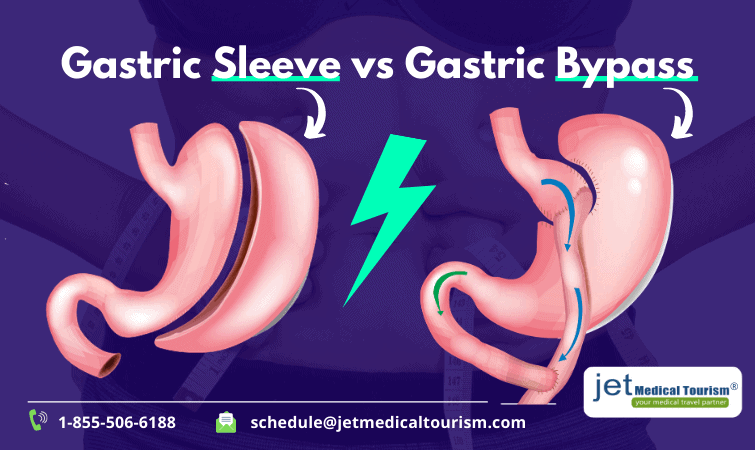
Gastric sleeve versus gastric bypass is one of the main questions that bariatric patient look for. Both the surgery options are quite popular and offer different set of pros and cons. This article will help you compare Gastric Sleeve vs Gastric Bypass surgery pros and cons and learn about expected weight loss, side effects, and cost to decide which surgical procedure is best for you.
Deciding between gastric sleeve vs gastric bypass is an important decision and comparing the difference can help you make the final decision. Read further to know what is the difference between gastric bypass and gastric sleeve surgery.
Gastric sleeve vs bypass: Which bariatric surgery is right for you?
It is necessary to understand the difference between gastric sleeve vs bypass because these are the two major bariatric surgery options available to most patients. While both procedures are performed laparoscopically, gastric bypass is a more invasive surgery than gastric sleeve. Unlike sleeve gastrectomy, a Roux-en-Y gastric bypass involves surgical rerouting of the intestine.
You should carefully gastric sleeve vs bypass surgery together with your weight loss surgeon at the time of initial consultation. Your surgeon will assess your BMI and determine whether you have any obesity related co-morbidities such as type 2 diabetes. They will also explain to you the advantages and limitations of both approaches to help you make a poignant decision.
Gastric sleeve vs gastric bypass eligibility
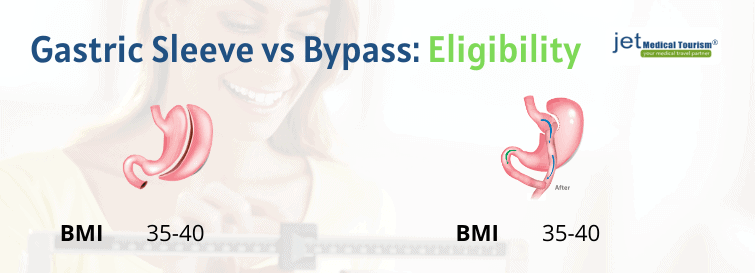
The primary eligibility for both gastric sleeve and gastric bypass surgery is that your body mass index (BMI) should be 40 or above, or at least 35 if you have a weight-related medical condition. But there are differences as well.
Gastric Sleeve Eligibility
Individuals who are considered high-risk surgical patients, such as those with serious heart or lung disease, are usually better candidates for gastric sleeve surgery. The anesthesia time in this surgery is relatively shorter, and recovery is faster. Secondly, people who have undergone abdominal surgeries previously will be more suited for gastric sleeve surgery.
Gastric sleeve only involves surgery of the upper abdominal area, which is typically less affected by the scar tissue from any previous abdominal surgeries. Finally, patients who are using multiple medications for anxiety or depression are more eligible for sleeve gastrectomy because this surgery will not so much affect how your body responds to or absorbs medications.
Gastric Bypass Eligibility
People who are suffering from very severe obesity, which means they have an excessively high BMI, may be more suited for gastric bypass surgery. That’s because they could lose a larger amount of weight with gastric bypass. Some research studies have shown that patients suffering from hypertension and high cholesterol levels may also benefit more from gastric bypass.
Individuals with chronic acid reflux (GERD) condition are also more eligible for gastric bypass surgery in many cases. GERD occurs when your stomach is unable to retain the food and acids, and the weak stomach muscle pushes the acid back up (reflux) into your esophagus. Acid reflux condition usually improves in patients who have undergone gastric bypass surgery.
Related: Gastric bypass requirements: Am I a good candidate for it?
Gastric sleeve vs gastric bypass cost

- Gastric sleeve cost in Mexico averages $4,000 vs. $18,000 on average in the US and Canada. At the higher end of the range, the cost of gastric sleeve in Mexico may average $6,000 vs. $25,000 in the US and Canada. In Mexico, sleeve gastrectomy cost will include the surgeon’s fee, hospital charges, one-night stay at the hospital, pre- and post-surgical lab work, and the nutritionist’s fee. Your cost in the US, even with insurance coverage, may be higher than that in Mexico because of the co-pays and deductibles that you will be charged.
- Gastric bypass cost in Mexico averages $5,500 vs. $25,000 on average in the US and Canada. Even if you choose the best bariatric surgeon in Mexico and a top-rated Mexico hospital for your gastric bypass, your cost may be well within $7,500 at the high end of the range. In comparison, the cost in the US or Canada can easily exceed $30,000 when you work with a well-qualified and experienced weight loss surgeon. Your Mexico gastric bypass package will include the surgeon’s fee, anesthesia charges, operating room and overnight stay costs, and airport pick-up and drop facility. Read more on gastric bypass cost.
VSG vs RNY Cost Comparison Table
| Bariatric Surgery Cost | Mexico | US / Canada |
| Gastric Sleeve Cost | $4,000 ~ $5,500 | $18,000 ~ $25,000 |
| Gastric Bypass Cost | $5,500 ~ $7,500 | $25,000 ~ $30,000 |
Gastric sleeve surgery vs gastric bypass: Insurance coverage
Insurance coverage can sometimes influence your choice between gastric sleeve surgery vs gastric bypass. When you are evaluating your options, you should talk to your insurance provider to check whether you qualify for bariatric surgery. Some insurers will have specific criteria to determine your eligibility.
Based on their feedback, you can discuss with your bariatric surgeon for the appropriate choice of procedure.
Insurance Coverage for Gastric Sleeve
As long as you meet the minimum qualifications of BMI and related medical conditions as defined by your insurer, they should no objection in approving your coverage for gastric sleeve. In fact, looking at the costs of gastric sleeve surgery vs. gastric bypass, the insurance company may prefer if you choose gastric sleeve. This is because VSG is usually a lower cost procedure than gastric bypass, and the insurer will benefit financially if you choose it.
Insurance Coverage for Gastric Bypass
If your BMI is relatively higher, and you also have a specific obesity-related illness, your bariatric surgeon may recommend a gastric bypass surgery. In this situation, you should obtain the required documentary evidence and a copy of your surgeon’s prescribed procedure and submit it to your insurer. The faster you complete the formalities, the sooner your insurance coverage request will be approved.
Surgical risk gastric sleeve versus gastric Bypass
Your risks for both gastric bypass and gastric sleeve surgery are minimized as long as you choose a highly competent bariatric surgeon. Nevertheless, you should know the risks in order to make an intelligent choice.
Gastric Sleeve Risks
Gastric sleeve surgery in Mexico may entail the following potential risks in a few cases: blood clotting, gallstones (the risk is higher with major or rapid weight loss), internal bleeding or excessive bleeding of the wound, hernia, perforation in the intestines or stomach, skin separation, and iron or vitamin deficiency.
You can minimize your gastric sleeve surgery risks by making sure that you avoid smoking at least for the minimum period advised by your surgeon or quitting the habit altogether. Secondly, if you gradually increase your daily physical activity and the duration of your fitness exercises, you will reduce your long-term risks related to gastric sleeve.
Gastric Bypass Risks
Serious gastric bypass complications are rare, but some of the potential risks and complications after your gastric bypass include: dumping syndrome, breakage, gallstones, leakage, stomach or intestine perforation, hernia, bowel obstruction or pouch obstruction, calorie or protein malnutrition, cardiac or pulmonary problems, spleen injury, or ulcers in the stomach or intestine.
Many of the risks can be reduced if you follow a healthy and balanced diet as advised by your nutritionist after your gastric bypass surgery. A diet rich in proteins, vitamins, and iron will ensure that you do not face a deficiency and its related conditions. A regular exercise regimen will help you fight off cardiac and lung problems.
Rate of weight loss sleeve vs bypass
When comparing the amount of weight loss you can expect from gastric sleeve vs. gastric bypass, you should also look at the rate or speed at which you are likely to lose weight with each of these procedures.
Gastric Sleeve Weight Loss Rate
Gastric sleeve weight loss rate is rapid, and you will start losing weight almost immediately after your sleeve gastrectomy surgery. In the first 15 days, you can lose anywhere from 10 to 20 pounds. Patients typically lose about one pound per day during this early phase. In the first three months, you would have shed about 35 to 45 percent of your excess body weight.
By the end of six months, about 50 to 60 percent of your excess weight would be lost. At the end of first year, if you have followed the surgeon’s post-operative instructions well, you would have lost about 70 percent of your total excess body weight. The rapidity of weight loss is higher in the first six months, and then it starts diminishing as you reach closer to your ideal body weight.
Gastric Bypass Weight Loss Rate
Gastric bypass weight loss rate begins relatively slowly compared to gastric sleeve. On average, you may start losing about two pounds per week. This means, by the end of six months, you can expect to lose about 50 pounds. However, this will depend on your original body weight at the time of surgery. In general, you would have lost about 30 to 40 percent of your excess body weight in the first six months.
At about 12 to 18 months after your gastric bypass surgery in Mexico, you would have lost a substantial amount of excess weight and would be closer to your target body weight. Many patients are able to lose up to 100 pounds by this time. On average, you may expect to lose up to 70 percent of excess body weight at 18 months.
Average weight loss sleeve vs bypass
Average weight loss in absolute terms after your gastric sleeve or gastric bypass surgery may not be very different. If you have followed the prescribed diet and exercise plan, you will have successful results.
Gastric Sleeve Average Weight Loss
In about 12 to 18 months after your gastric sleeve surgery, you will lose about 60 to 70 percent of your excess body weight. This means, if you were 100 pounds overweight at the time of surgery, you would have shed off about 70 pounds of that excess weight.
It’s vital to understand that these are average statistical results, but individual results can vary depending on your general health condition and other factors. If you have been eating right and exercising regularly, you will have more significant weight loss results at 12 to 18 months.
Gastric Bypass Average Weight Loss
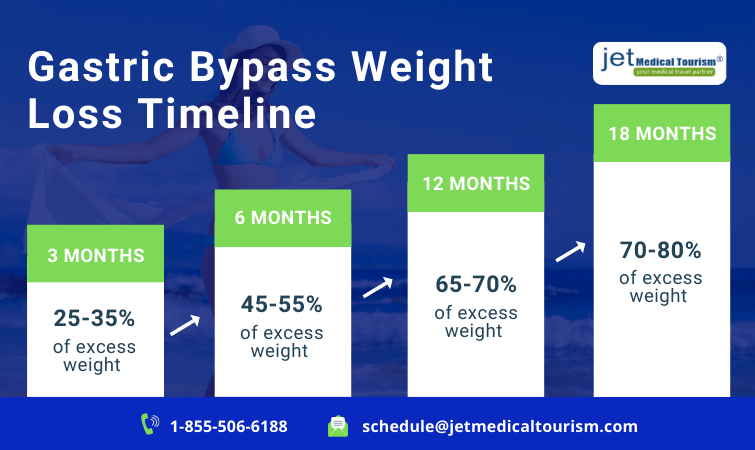
Within 12 to 24 months after your gastric bypass surgery, you will lose about 65 to 70 percent of your excess body weight. According to a Mayo Clinic research study, patients who are motivated and comply with the surgeon’s instructions can lose half or more of their excess weight within two years after a gastric bypass.
You should know that the weight loss rate and the average weight loss figures usually refer to your “excess” body weight, and not your total starting weight. Your goal with gastric bypass surgery is to lose only the excess weight, and get closer to your ideal body weight.
Related: Gastric bypass weight loss chart
Gastric sleeve vs gastric bypass pre op diet
Gastric sleeve vs gastric bypass pre op diet can vary depending on the surgeon’s plan and your unique BMI and health parameters. One of the important differences between the two pre op diets is that in gastric bypass there will be an added focus on nutritional supplements. Secondly, the duration of pre op liquid diet could be longer in case of gastric bypass. Your nutritionist will explain you the specifics of gastric sleeve vs gastric bypass pre op diet.
Gastric Sleeve Pre Op Diet
- Gastric sleeve pre op diet will begin about three weeks prior to your scheduled date of surgery.
- Limit the intake of carbohydrates, refined sugars, and carbonated drinks in your diet.
- Increase your intake of lean proteins to at least 60 grams a day.
- Include small quantity of healthy fats in your diet, such as olives, nuts, and fish.
- Switch to an all-liquid diet about two days prior to your gastric sleeve surgery. Focus only on water, clear soups, protein shakes, broth, and gelatins during this phase.
Gastric Bypass Pre Op Diet
- Gastric bypass pre op diet will begin about four weeks prior to your scheduled date of surgery.
- Reduce the intake of carbohydrates, sugars, and caffeine similar to the gastric sleeve pre op diet plan.
- Choose high protein meal replacements to reduce the fatty deposits around your liver. Eat 70 grams or more of proteins per day.
- Start taking nutrition supplements ahead of your surgery in consultation with your surgeon.
- Switch to an all-liquid diet at least three to four days prior to your gastric bypass surgery. Include clear soups, thin cream of rice or wheat, protein shakes, and vegetable juices in your liquid diet.
Gastric sleeve vs gastric bypass post op diet
Post-operative diet after your gastric sleeve or gastric bypass will largely remain the same, but some key differences should be noted. How diligently you follow your diet plan will impact your final weight loss results.
Gastric Sleeve Post Op Diet
Your diet plan begins a few days ahead of your surgery date. For two days before your gastric sleeve surgery in Mexico, you should be on a clear liquid diet. For up to one week after your surgery, your surgeon may recommend you to have clear liquid (sugar free) diet only.
From the second week, you can add thicker liquids and smooth foods to the diet. From the third week, you can slowly choose soft solid foods and pureed foods. Within a month after your gastric sleeve surgery, you should be ready to test solid foods in your diet.
Gastric Bypass Post Op Diet
The general post op diet plan for your gastric bypass surgery in Mexico will be very similar to that of gastric sleeve as described above. However, some dietary guidelines are unique to gastric bypass. You should avoid foods that may cause dumping, such as sugars and excess fats or refined carbs.
The risk of Alcohol Use Disorder (AUD) is higher in patients who have had a gastric bypass. Therefore, avoiding or minimizing alcoholic beverages would be prudent even in the long run after your surgery. Vitamin B1 supplementation will be much more important for you after a gastric bypass.
Gastric bypass vs sleeve for diabetes
Gastric sleeve and gastric bypass surgery usually help patients achieve similar level of early improvements in their symptoms of type 2 diabetes. However, there are some key differences in how they work.
Gastric Sleeve for Diabetes
Many patients suffering from obesity also have type 2 diabetes symptoms or may be taking medications to control it. Gastric sleeve can provide relief from these symptoms to a considerable extent. As the excess weight is lost, the diabetes symptoms begin to fade away.
With sleeve gastrectomy, researchers have noted early improvements in function of Beta-cell for patients who have obesity along with type 2 diabetes. As the Beta-cell function gets more regulated, the symptoms of diabetes will improve, at least in the early stage.
Gastric Bypass for Diabetes
Gastric bypass surgery in Mexico is known to have a deeper and long-lasting impact in reducing or eliminating type 2 diabetes symptoms. Studies have shown that patients who chose gastric bypass had relatively higher rates of diabetes remission and reduced incidence of diabetes relapse.
According to a major research study, which was published in JAMA Surgery, it was noted that after a gastric bypass, patients experienced more effective glycemic control in the long-term compared to those who chose gastric sleeve surgery. However, more research is still required to conclusively determine the outcomes, particularly in the longer term.
Sleeve gastrectomy vs gastric bypass hospital stay
Your surgery time in the operating room as well as the duration of your hospital stay can differ between vertical sleeve gastrectomy vs gastric bypass. Sleeve gastrectomy is a relatively less invasive surgery, which will only involve changes to the stomach tissue and not the intestine. Gastric bypass, on the other hand, can be more complicated because it will also involve intestinal rerouting in addition to stomach volume reduction.
In many cases, patients may not require an overnight stay in the hospital for their sleeve gastrectomy. You will remain under observation for a few hours, and once the anesthesia effect dissipates, you can leave the hospital. But for gastric bypass, you might have to stay for one to two nights at the hospital for initial recovery. Talk to your surgeon about sleeve gastrectomy vs. gastric bypass hospital stay during your consultation process.
Gastric sleeve vs bypass recovery time
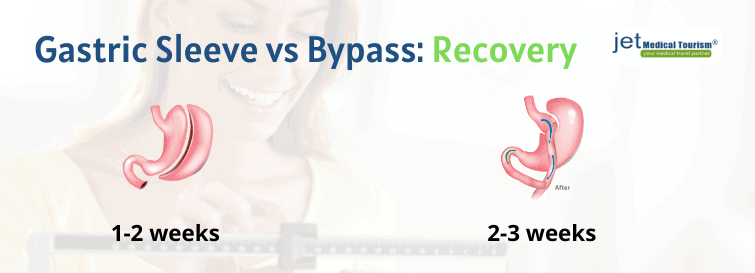
Recovery time after gastric bypass and gastric sleeve surgery can vary in each case depending on individual factors, such as your medical condition, extent of surgery, and the type of surgical technique used.
Gastric Sleeve Recovery Time
Most patients will recovery after gastric sleeve surgery in Mexico in about one to two weeks. It is best that you plan your surgery in a way that you can recover and recuperate for a week after your gastric sleeve at your hotel in Mexico. When you are back to your home country, you should take another week’s rest at home before returning to work.
If your gastric sleeve surgery is performed using laser technique, the incisions will be smaller and consequently, your recovery may be speedier compared to a traditional surgery. Even after you resume your normal activities, it will take a few weeks before you can fully go back to your physical exercise and fitness routine.
Gastric Bypass Recovery Time
In general, the gastric bypass recovery time may be slightly longer than that of gastric sleeve. You may require about three weeks of rest after your gastric bypass surgery before you can go back to your workplace. You should be aware that recovery time in individual cases will significantly vary, and there is no uniform recovery for everyone.
Make sure to follow your bariatric surgeon’s post-operative care instructions to have a safe and expedited recovery. While you can resume your regular activities in about three weeks, you should continue to avoid vigorous exercises, bending and lifting of heavy objects for another two to three weeks.
Gastric bypass vs sleeve results
Both gastric sleeve and gastric bypass surgeries will often produce similar results in terms of long-term weight loss. But other physiological and medical benefits can vary in each of these procedures.
Gastric Sleeve Results

Gastric sleeve is usually produces more predictable outcomes with a reduced risk of complications because the procedure is less complex. You will feel naturally less hungry after your vertical sleeve gastrectomy (VSG) because the procedure will reduce the hunger hormone ghrelin in your body.
Your digestive system will improve, and unlike gastric bypass, you will not experience significant nutritional deficiencies. The surgery will not make changes to your pyloric valve and small intestine, so even if you have pre-surgery medical problems, you will achieve safer results with gastric sleeve.
Gastric Bypass Results

Weight loss results after your gastric bypass will occur more gradually, but are also likely to be more sustainable in the long run. More research has gone into evaluating the long-term results of gastric bypass compared to gastric sleeve, which is relatively newer procedure.
Gastric bypass surgery will limit your amount of food intake, while malabsorption triggered by this surgery will further promote your weight loss. Your urge to eat more sugary foods will be reduced. Studies have shown that gastric bypass produces consistently positive outcomes among most patients.
Gastric bypass vs sleeve success rate
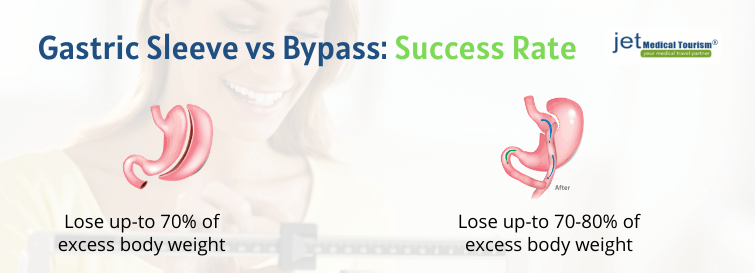
Success rate of both gastric sleeve and gastric bypass is very high, provided you work with an experienced bariatric surgeon. However, you should know the precise success rates to make an informed decision.
Gastric Sleeve Success Rate
According to the UCLA researchers, the success rate of gastric sleeve surgery is about 80 to 90 percent. In other words, approximately 8 or 9 patients out of 10 can expect to achieve successful weight loss results after their sleeve gastrectomy procedure. Clearly, the low failure rate makes gastric sleeve surgery a popular procedure.
Researchers say that people can lose on average about 60 to 70 percent of their excess body weight with gastric sleeve. Most patients will reach their lowest body weight within one to two years after their gastric sleeve surgery. The key is to diligently follow your surgeon’s post-op care instructions.
Gastric Bypass Success Rate
Gastric bypass surgery is often considered the gold standard in bariatric surgeries because of its high success rate. According to studies cited by Obesity New Today, more than 85 percent of the people who undergo a gastric bypass will lose and maintain at least 50 percent of their initial excess weight loss.
This indicates a gastric bypass success rate of about 85 percent. The average excess weight loss for most patients will be in the range of 65 percent. Early serious complication rates after gastric bypass surgery are about five percent, which indicates a very high degree of safe and successful results with this procedure.
Gastric sleeve vs gastric bypass pros and cons
Before you make a final decision about the choice of procedure, you should objectively consider the pros and cons of gastric sleeve vs gastric bypass. In many cases, the bariatric surgeon may leave the final choice to you if you are an equally good candidate for either surgery.
Here are a few solid pros and cons for gastric sleeve vs gastric bypass for you to consider.
- Surgical Risk: Gastric sleeve surgery has a lower risk during the operation. The laparoscopy technique has made the procedure safer and more precise. The surgery is of a shorter duration, so your anesthesia risk is also proportionately lower.
- Invasiveness: Gastric sleeve surgery is relatively less invasive than gastric bypass because it does not involve complex intestinal changes. Your post-op recovery will also be faster in case of gastric sleeve and the subsequent scarring will be minimal.
- Weight Loss Rate: Gastric bypass surgery has an advantage over gastric sleeve on this parameter. You can expect to lose weight more rapidly in gastric bypass because your stomach’s storage capacity as well as the body’s calorie absorption will be reduced.
- Co-morbidity Resolution: When considering the gastric sleeve vs gastric bypass pros and cons, your medical condition will be a determining factor. Gastric bypass is more effective in resolving the symptoms of co-morbities such as type 2 diabetes.
- Complications Rate: Post-operative side effects and complications are often higher in case of gastric bypass surgery. Nutritional deficiency, in particular, is a significant risk to be considered after a gastric bypass.
- Cost of Surgery: Gastric sleeve surgery is more affordable than gastric bypass surgery. Higher success rate, lower risk of revision surgery, and reduced dependence on medications and supplements contribute to lower long-term costs as well.
Related: Gastric bypass pros and cons
Compare gastric sleeve vs gastric bypass
Bariatric surgery statistics show that gastric sleeve and gastric bypass are being chosen more often for treating long-term weight loss than all other surgical procedures.
- In fact, gastric bypass accounts for approximately 80% of all the bariatric surgeries in the United States.
- Comparing gastric sleeve vs gastric bypass can be a time consuming process. And, no matter the surgery option you choose – both gastric sleeve and gastric bypass requires serious commitment to behavior and diet modifications.
- Gastric sleeve and gastric bypass surgeries are two forms of bariatric surgery, which are procedures that can alter both the size and shape of the stomach.
- Although both methods are popular and result in weight loss surgeries, there are many differences between them.
If you’re considering gastric sleeve or gastric bypass surgery, here’s what you need to know about them to make an informed decision. The following information compares the differences between gastric sleeve versus gastric bypass.
Gastric sleeve surgery
Surgical risk: low to moderate
Rate of weight loss: slower than gastric bypass
Average weight loss: 50-80% of excess body weight within 12 months
Operating time: 1-2 hours
Recovery time: 3-4 weeks
Hospital stay: 2 nights
Time off work: 2 weeks
Reversible: No
Medical implant: No
How it promotes weight loss: restrictive, limits food intake, reduces hunger sensations by removing Ghrelin (hormone that plays a key role in regulating body weight)
Change to intestine: no change to the intestine during gastric sleeve surgery
Change to stomach: stomach size is reduced, 60-80% of the stomach is removed, leaving a vertical narrow pouch 2-3 oz (60-100 cc)
Bariatric Diet & Dietary Guidelines:
– 600-800 calories per day during weight loss (24 months)
– Eat protein rich foods
– Avoid high calorie and fat food
– Avoid carbonated drinks
– Drink 6-8 cups of water a day
– Eat 1000-1200 calories per day after 24 months
New Eating Habits After Bariatric Surgery:
– Eat small portions daily
– Eat 4-6 times a day
– Chew food thoroughly to puree consistency before swallowing
– Eat slowly
– Eat high-protein foods
– No drinking with meals, drink water 30 minutes before or after meals
Bariatric Vitamins, Minerals & Nutritional Supplements:
– Multivitamin
– Calcium
– Vitamin B12
Pros, Benefits, Advantages of Weight Loss Surgery:
– Pyloric valve and small intestine are kept intact
– Reduces hunger (the portion of stomach that produces Ghrelin, the hunger stimulating hormone, is removed)
– Option for patients who do not qualify for band or bypass
– Fewer food intolerances
– Low malnutrition risk
– May be converted to gastric bypass or duodenal switch
– Revision option for gastric band patients
Cons, Risks, Disadvantages of Weight Loss Surgery:
– Bleeding
– Blood clots
– Leakage
– Infection
– Pneumonia
Am I a Candidate for Gastric Sleeve Surgery?
– Gastric sleeve is best for obese patients
– High-risk patients with a BMI > 60 as a “first-stage” procedure
Gastric bypass surgery
Surgical risk: moderate
Rate of weight loss: rapid
Average weight loss: 60-85% of excess body weight within 12-18 months
Operating time: 1-3 hours
Recovery time: 9-12 weeks
Hospital stay: 2-3 nights
Time off work: 2-3 weeks
Reversible: could be but high risk
Medical implant: No
How it promotes weight loss: restrictive and malabsorption, limits food intake, reduces absorption of calories and nutrients
Change to intestine: small intestine is cut and bypassed during RNY gastric bypass surgery
Change to stomach: new stomach is created, stomach is divided into a small upper pouch 1 oz (20-30 cc) and a larger lower pouch
Bariatric Diet & Dietary Guidelines:
– 600-800 calories per day during weight loss (12-18 months)
– 3 small protein meals per day
– Avoid sugar and fats to prevent dumping
– Avoid carbonated drinks
– Drink 6-8 cups of water a day
– Eat 1000-1200 calories per day after 18 months
New Eating Habits After Bariatric Surgery:
– Eat small portions daily
– Chew food thoroughly to puree consistency before swallowing
– Eat slowly
– Eat high-protein foods
– No drinking with meals, drink water 30 minutes before or after meals
Bariatric Vitamins, Minerals & Nutritional Supplements:
– Multivitamin
– Calcium
– Iron
– Vitamin B12
Pros, Benefits, Advantages of Weight Loss Surgery:
– Rapid weight loss during the first 6-months
– Reduces food intake
– Reduces calorie intake
– Proven long-term effectiveness maintaining weight loss
– Most common and widely accepted weight loss surgery
Cons, Risks, Disadvantages of Weight Loss Surgery:
– Blood clots
– Bowel obstruction
– Dumping syndrome
– Infection
– Leaks
– Nutrient deficiencies
-Reflux (GERD)
– Ulcers
Am I a Candidate for Gastric Bypass Surgery?
– Gastric bypass is most effective for patients with a BMI of 35-55
Gastric bypass vs sleeve: Similarities
Although most patients like to focus only on the differences between gastric bypass vs sleeve, it is prudent to also look at the similarities. Both the procedures are recommended as safe and proven bariatric surgeries today. While gastric sleeve is more popular, you should remember that gastric bypass was the original gold standard in weight loss surgeries and still continues to be an excellent procedure for the right candidates.
Success Rates and Patient Satisfaction
The most important similarity between gastric bypass vs sleeve is that both procedures command very similar success rates. Although the initial weight loss rate may be faster in case of gastric bypass, you can eventually lose a similar amount of excess weight at the end of first year. As long as you have chosen a skilled and experienced bariatric surgeon, you can expect equally satisfying outcomes with both surgeries.
Commitment to Dietary Guidelines
Both gastric bypass vs sleeve require an equal degree of long-term commitment from the patient for maintaining a healthy diet. If you are prepared to follow your surgeon’s dietary guidelines after your gastric bypass or sleeve surgery, you can expect to enjoy lifelong benefits. In fact, the long-term post-op diet plan is also very similar between gastric bypass and gastric sleeve surgery.
Gastric sleeve vs gastric bypass long term
Medical researchers over the years have evaluated gastric sleeve vs gastric bypass long term results in order to provide more clarity on which surgery is more effective. However, most of the research studies continue to show that both procedures are fairly successful in helping patients achieve their weight loss goals.
Long-Term Weight Loss
A majority of patients will be able to maintain their weight loss results at five years in both gastric sleeve and gastric bypass surgeries. Although less data is available for gastric sleeve, studies indicate that even at 10 or 15 years after the surgery, many patients can maintain up to 60 or 70 percent of their excess weight loss. The key lies in how diligently a patient follows a long-term balanced diet and maintains an active lifestyle.
Long-Term Co-morbidities
When comparing gastric sleeve vs gastric bypass long term results, it is important to consider whether the patient suffers from any obesity-related health conditions. Long-term resolution or reduction of symptoms may be better for patients who have undergone gastric bypass. This is particularly seen in case of patients with type 2 diabetes. But in general, even with gastric sleeve, the incidence of co-morbidities will be substantially lower.
Mini gastric bypass vs sleeve gastrectomy
If you are evaluating your weight loss surgery options between a mini gastric bypass vs sleeve gastrectomy, you should do an objective comparison. During your initial consultation, you can request your surgeon to explain the benefits and limitations of each surgery. While the final decision will depend on your unique health parameters and your personal goals, here are a few differences to consider between mini gastric bypass vs sleeve gastrectomy.
Mini Gastric Bypass – Highlights
- Minimal rerouting of the small intestine
- The procedure is partially reversible and can be revised
- Lower rate of complications compared to a full RNY gastric bypass
- Initial weight loss is more rapid
- Recovery is faster than a traditional gastric bypass
Sleeve Gastrectomy – Highlights
- No changes to the small or large intestine are involved
- The procedure is irreversible because of partial stomach removal
- Patients with low BMI may also qualify for this surgery
- Minimal complications, quick recovery, negligible scarring
- Subsequent conversion to gastric bypass is possible
Mechanism of action: Gastric sleeve vs gastric bypass
- Gastric Sleeve Surgery: After a gastric sleeve, about 10 percent of the stomach remains and is arranged into a small upright sleeve. This procedure promotes weight loss in two ways. The first is by restricting the amount of food you can consume, and the second is by reducing feelings of hunger by removing a large part of the stomach that produces the hunger-inducing hormone ghrelin.
- Gastric Bypass Surgery: Gastric bypass, on the other hand, is both restrictive and malabsorptive dividing the stomach and the small intestine into two sections. Next, the smaller portion of the stomach is reconnected to the small intestine. Like a gastric sleeve, gastric bypass promotes weight loss by limiting food intake, but it also serves to reduce the calories and nutrients your body can absorb, thereby resulting in further weight loss.
Reporting results, outcomes: Gastric sleeve versus gastric bypass
Reporting of weight loss results and outcomes after bariatric surgery are often determined by 1) the percentage of excess weight loss, 2) the percentage of improvement or resolution of obesity-related comorbidities, 3) the risks of complications and 4) the risk of death.
Expected weight loss: Gastric sleeve vs gastric bypass
- Gastric Sleeve Surgery: Patients can expect to lose as much as 50 to 80 percent of their excess body weight within 12 to 24 months of surgery. Clinical studies show that patients experienced 55.4 percent excess gastric sleeve weight loss with follow-up periods every 3 to 60 months. Patients can expect to lose 25 to 30 pounds within the first 30 days after surgery and achieve their ideal weight goal within 9 months after surgery.
- Gastric Bypass Surgery: Patients can expect to lose up to 60 to 85 percent of their excess body weight within 12 to 18 months of surgery. Clinical studies show that patients were successful in sustaining gastric bypass weight loss over a long period of time – keeping more than 61 percent of the excess body weight off for up to 20 years.
Improvement, resolution of co-morbid conditions
Both gastric sleeve and gastric bypass are effective in improving or complete resolution of comorbid conditions such as type 2 diabetes, high blood pressure (hypertension), high cholesterol, obstructive sleep apnea, and acid reflux (GERD).
However, gastric bypass is more effective at resolving and improving obesity-related comorbidities, plus it has the advantage of being able to eliminate gastro-esophageal reflux disease (GERD) in most cases. If your life is affected by any of these conditions, gastric sleeve or gastric bypass may help you.
- Gastric Sleeve Surgery: Bariatric and metabolic studies report that gastric sleeve “resolved” type 2 diabetes (56%), high blood pressure (49%), high cholesterol (67%), and sleep apnea (60%). Additionally, clinical studies show that gastric sleeve surgery “improved” type 2 diabetes (37%), high blood pressure (29%), high cholesterol (38%), and sleep apnea (33%).
- Gastric Bypass Surgery: Bariatric and metabolic studies show that gastric bypass “resolved” type 2 diabetes (76.8%), high blood pressure (61.7%), high cholesterol (70-95%), sleep apnea (85.7%) and acid reflux (98%). Furthermore, clinical studies show that gastric bypass surgery “improved” type 2 diabetes (85.4%), high blood pressure (78.5%), high cholesterol (70-95%), and sleep apnea (83.6%).
Complications: Gastric sleeve and gastric bypass
Both gastric sleeve and gastric bypass have some complications in common such as bleeding and leakage from the staple line. Gastro-esophageal reflux disease (GERD) after gastric sleeve surgery is common, whereas gastric bypass will improve it. Some complications are possible with gastric sleeve, but are more common among gastric bypass patients, including dumping syndrome, intestinal obstruction, malnutrition or deficiencies, anastomotic stricture and gallstones.
Related: Gastric sleeve complications
Gastric sleeve patients require less time for recovery and can get back to most normal functions within three to four weeks. By contrast, gastric bypass patients need nine to 12 weeks for recovery time. However, following either surgery, patients can get back to work within two to three weeks.
Related: Gastric bypass complications
Gastric bypass vs sleeve: Which bariatric surgery is reversible?
While considering gastric bypass vs sleeve surgery, you may want to know whether these procedures can be reversed at a later stage. In general, both these surgeries are irreversible. Therefore, you should make your decision after a careful deliberation and in close consultation with a reliable bariatric surgeon.
- Gastric Bypass: Your surgeon will divide the stomach into two parts, and will seal off the upper portion to reduce your eating capacity. In the second stage, the surgeon will cut across the intestine and attach it directly to the new stomach pouch. These cuts and incisions typically cannot be reversed.
- Gastric Sleeve: Between gastric bypass vs sleeve surgery, the latter is less invasive, but it still involves reduction of the stomach volume. Your surgeon will remove about 75 to 80% of your original stomach and leave a small sleeve-shaped pouch behind. This procedure cannot be reversed later on.
Related: Is gastric sleeve reversible?
Considering gastric sleeve vs gastric bypass
No matter what weight-loss surgery option you choose – gastric sleeve or gastric bypass… making a serious commitment to behavior and diet modifications is critical to sustained weight loss.
Interested in getting approved for gastric bypass or gastric sleeve surgery in Mexico? Find out if you qualify by clicking through to our online application form or contact us today to find out more.
VSG vs RNY: Still not sure which bariatric surgery is right for you? Jet Medical Tourism® can help. Contact today!
Choosing between VSG vs RNY surgery is a vital decision, which will impact your long-term weight loss goals. At Jet Medical Tourism®, we understand that your body and your personal goals are unique to you. Therefore, you need a bariatric surgery that is tailored to meet your specific requirements.
We can help you resolve your concerns about the right choice between VSG vs RNY surgery. You can schedule a free consultation with one of our experienced bariatric surgeons. They will review your BMI and health factors and make the best recommendation for you. Call us now to book an appointment.

